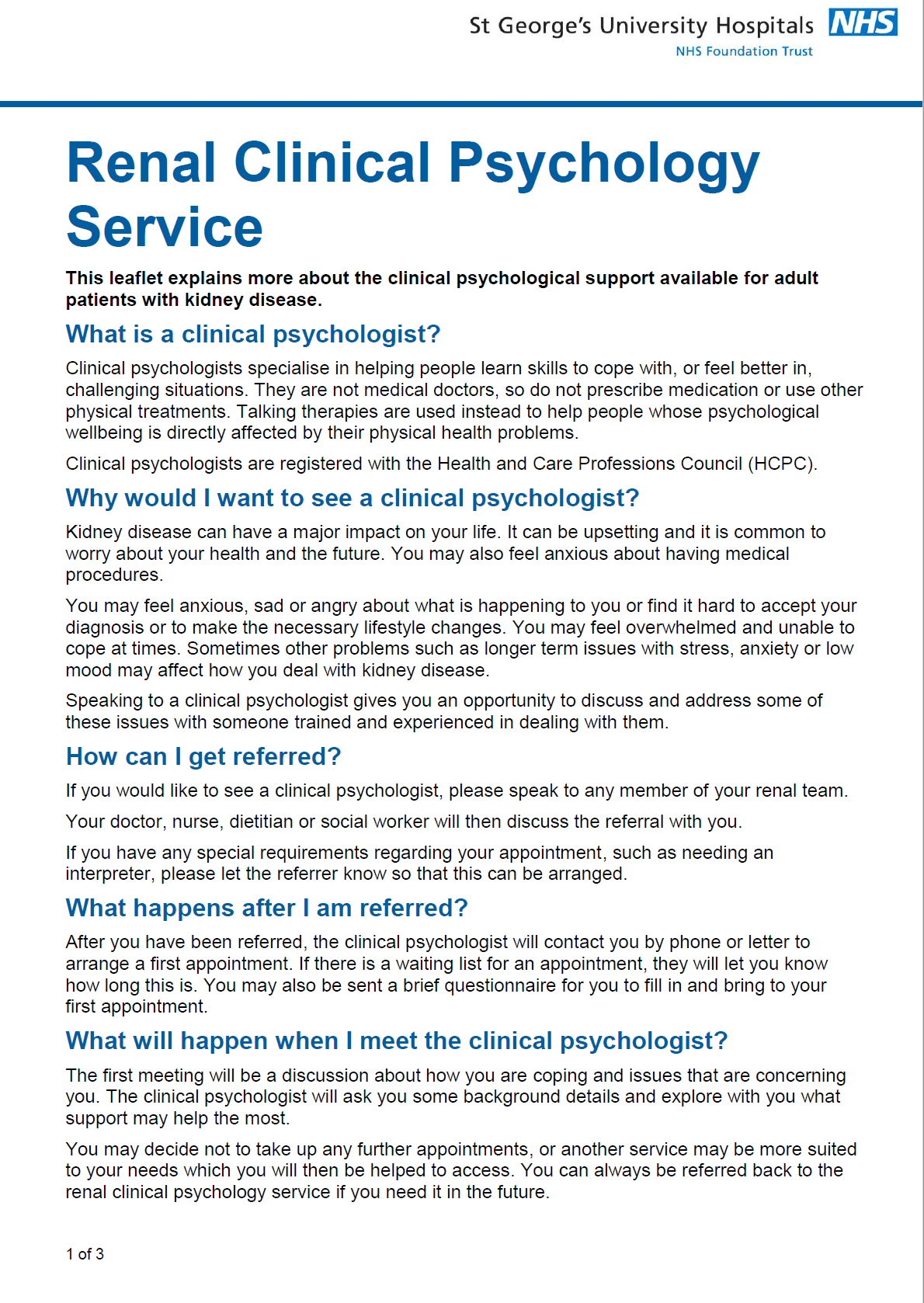Counsellor - clinical psychologist

The renal unit has a dedicated clinical psychologist who is available, on referral from the clinical team, to provide support dealing with the emotional challenges of renal disease.
What is a clinical psychologist?
-
Clinical psychologists specialise in helping people learn skills to cope with, or feel better in, challenging situations.
-
They are not medical doctors, so do not prescribe medication or use other physical treatments.
-
Talking therapies are used instead to help people whose psychological wellbeing is directly affected by their physical health problems.
-
Clinical psychologists are registered with the Health and Care Professions Council (HCPC).
Why would I want to see a clinical psychologist?
-
Kidney disease can have a major impact on your life. It can be upsetting and it is common to worry about your health and the future. You may also feel anxious about having medical procedures.
-
You may feel anxious, sad or angry about what is happening to you or find it hard to accept your diagnosis or to make the necessary lifestyle changes. You may feel overwhelmed and unable to cope at times. Sometimes other problems such as longer term issues with stress, anxiety or low mood may affect how you deal with kidney disease.
-
Speaking to a clinical psychologist gives you an opportunity to discuss and address some of these issues with someone trained and experienced in dealing with them.
- Information about common feelings in renal patients can be found here.
How can I contact you or be referred?
-
If you would like to see a clinical psychologist, please speak to any member of your renal team. Your doctor, nurse, dietitian or social worker will then discuss the referral with you.
-
If you have any special requirements regarding your appointment, such as needing an interpreter, please let the referrer know so that this can be arranged.
- If you have been referred and would like to discuss your referral, please contact the Renal Psychology Service. Contact information can be found here
What happens after I am referred?
- After you have been referred, the clinical psychologist will contact you by phone or letter to arrange a first appointment. If there is a waiting list for an appointment, they will let you know how long this is. You may also be sent a brief questionnaire for you to fill in and bring to your first appointment.
What will happen when I meet the psychologist?
-
The first meeting will be a discussion about how you are coping and issues that are concerning you. The clinical psychologist will ask you some background details and explore with you what support may help the most.
-
You may decide not to take up any further appointments, or another service may be more suited to your needs which you will then be helped to access. You can always be referred back to the renal clinical psychology service if you need it in the future.
-
If psychological support within the renal service would be helpful now, the clinical psychologist will arrange to meet with you for a number of sessions. This may be as an outpatient or on a ward if you are an inpatient.
Will my information be kept confidential?
-
The clinical psychologist will take notes during or after your appointment. These will be kept separately from your main medical records and stored securely and confidentially. A summary of the session will be put into your main medical notes, to help the whole renal team look after you in the best way they can.
- If there is anything you wish to keep confidential, please discuss this with the clinical psychologist. Your wishes will be respected as much as possible, but information about any serious or potential risk to you or other people will need to be shared with the relevant services.
- Letters which summarise the work you and the clinical psychologist do together will be sent to your GP, and the person who referred you. These letters will also be filed in your main medical records.
What if I do not want to see a psychologist?
-
Any referral to the clinical psychologist should be discussed with you first and only made with your agreement
-
You can choose not to be referred and you can change your mind after referral. This won’t affect any other aspect of your care.


